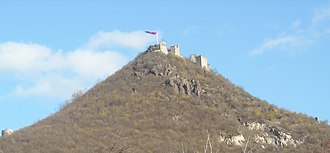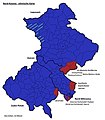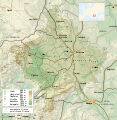Northern Kosovo
|
Northern Kosovo ( Serbian Северно Косово Severno Kosovo Albanian Kosova Veriore ) |
|||||
|
|
|||||
| Form of government | Community of Municipalities of the Autonomous Province of Kosovo and Metohija | ||||
| surface | 1259 km² | ||||
| population | 50,000 | ||||
| Population density | about 38.5 inhabitants per km² | ||||
| currency | Euro and Dinar (de facto) | ||||
| founding | June 28, 2008 | ||||
| Time zone |
UTC + 1 CET UTC + 2 CEST (March-October) |
||||
| License Plate | 02 ( RKS ), KM ( SRB ) | ||||
| Telephone code | +383 (0) 28 | ||||
| Medieval fortress near Zvečan | |||||
As northern Kosovo ( Serbian Северно Косово Severno Kosovo , Albanian Kosova Veriore ) is usually the area in the north of Kosovo referred to the predominantly by Serbs inhabited. These are the municipalities of North Mitrovica , Leposavić , Zvečan and Zubin Potok . It has an area of about 1300 km² (about 12% of the total area of Kosovo) with about 50,000 Serbian inhabitants. The political association of these communities is also known as Northern Kosovo .
A slightly different understanding of the term includes that sector of Kosovo that is administered by French KFOR units as MNTF North .
Topographically, northern Kosovo is determined by the areas of the Kopaonik Mountains north of the blackbird field .
Political development
Following the declaration of independence by the Kosovar parliament in February 2008, the three large Serbian municipalities declared that they would not cooperate with the government in Pristina because they did not recognize the declaration and continued to regard themselves as part of Serbia . On June 28, 2008, the Vidovdan , representatives of the Serbian residents mainly living in northern Kosovo founded their own parliament in Kosovska Mitrovica . Parliament is not recognized by the UN administration or other international organizations. In the more recent development it is therefore mostly referred to as the Association of Serbian Communities in Northern Kosovo and similar.
Since Kosovo's independence, the de facto independence of North Kosovo has been largely tolerated by KFOR and the Kosovar authorities. In Kosovo, however, there are increasing political voices, particularly voiced by the Vetëvendosje association , who want to force the complete integration of northern Kosovo into the state of Kosovo, if necessary with police force.
The EU consistently supports the unity of the country within its current borders, said the German Foreign Minister Westerwelle in 2011, in the opinion of his government “the map of the Western Balkans is fixed”.
In a referendum in February 2012, which was sharply criticized by both Pristina and Belgrade, 99.74% of the voters rejected the recognition of the Kosovar government. The turnout was around three quarters.
At the Western Balkans Conference in August 2015 in Vienna , an agreement between Serbia and Kosovo on Northern Kosovo was reached in the course of the rapprochement between Serbia and Kosovo, and all Western Balkan states declared that they would not block each other on their way to the EU, including the Northern Kosovo question not to be used as a means of pressure, but to be clarified in the context of EU integration.
Since the summer of 2018, a potential solution to the dispute over northern Kosovo has been emerging. An exchange of territory between Serbia and Kosovo is being discussed between Serbia and Kosovo, from northern Kosovo, which is predominantly inhabited by Serbs, to Preševo Valley, which is predominantly inhabited by Albanians .
Web links
- Dominik Zaum: States of Conflict: A case study on statebuilding in Kosovo , Institute for Public Policy Research (IPPR), October 23, 2009
Individual evidence
- ↑ Kosovo's Serbs have their own structures . In: NZZ Online, June 29, 2008
- ^ Elections in Kosovo - The hour of taboo breakers. FAZ online, December 12, 2010.
- ^ Federal Foreign Office: Support and European Perspectives for Kosovo , Auswaertiges-amt.de, date unknown (accessed on June 16, 2011, link no longer available).
- ^ Spiegel Online: "Referendum: Kosovo Serbs reject central government". In: Der Spiegel online, February 16, 2012.
- ↑ Western Balkans Summit: A push for the Balkans, then only the asylum issue / asylum policy dominates the Western Balkans Conference. In: der Standard online, August 27, 2015.
- ↑ Georgi Gotev: EU Commission contradicts Merkel: Balkan borders could be "corrected" , euractiv.de, August 27, 2018.









